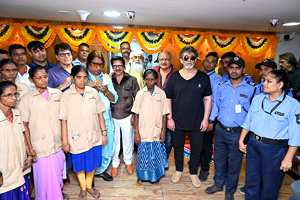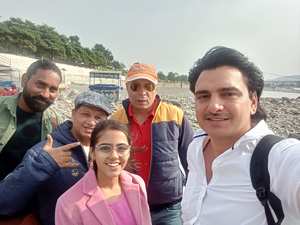When Ratan Tata Speaks The Country Listens

And of course, we do too! What happens when the most respected industrialist in the country meets a career architect and a passionate serial entrepreneur to discuss all things design and design thinking? Magic!
In a freewheeling yet insightful webinar Chairman Emeritus of Tata Sons Mr Ratan Tata, the CMD of the Della Group My Jimmy Mistry and renowned architect Mr Peter Rich came together; their agenda to innovate and find design thinking lead ways to kick start our economies once again, after the significant impact caused by #COVID19.
While the left brained number crunchers like banks, financial institutions and economists are grappling with this very question, Mr Mistry himself is of the opinion that more applied and creative solutions are the answer needed to harness India’s huge potential once again. He firmly believes that this is the time for architects, designers and the like to step up, pool in their combined right brained intellect and help regenerate the wheels of commerce in India again.
These three industry thought leaders, moderated by Utsav Mathur, dwelled on how design and design led thinking will be the differentiator to safeguard human capital in the #COVID19 era while creating innovation in the industry devoid currently of an impetus or a direction. The goal being to serve a huge populace of working professionals, from slum dwellers to executives and senior managers to CXOs, to help them adjust to what is soon to become the new ‘normal’.
It is interesting to note that in a conversation on future design and construction, Peter Rich was the only practicing architect on the panel. In fact Mr Tata was quick to point out that “I never regretted being an architect. I regretted not practicing it” after having received formal training in Los Angeles for 2 years.
We also know by now that Jimmy Mistry is loved and respected in the architectural and design fraternity for his fervour, his passion to practice and execute what is self-learnt and his ability to turn design thinking into a solution providing tool, across real world applications without a formal degree in design or architecture. This goldmine of innovative and free spirited thinking has gone on to resonate with the country and the webinar in a very short span of time has already garnered xxx views across social media platforms.



Do Right by our Human Capital
One of the topics that all three panellists spoke about passionately is slum rehabilitation. Mr Tata was deeply ashamed of the current situation on ground and highlighted the need to enrich human capital instead of dumping them far away from their current addresses and work places. Peter Rich was quick to add that especially in India, it was up to us Indians to find a logical and sustainable solution to the issue.
Jimmy Mistry called upon the usage of design thinking and anthropology to make any solution and subsequent execution in this aspect more human centric in its approach. He lamented on how currently only 17% to 18% of slums in Mumbai are actually redeveloped and even in that design thinking has not been allowed to play its part. He also very rightly pointed out that the solution to this issue was for the SRA to take lead and put out an open tender attracting the foremost developers in the country to take up redevelopment projects. This would allow a new lease of life to roughly 13 million fellow Indians and afford them the respect that they truly deserve.
Working from Home
The conversation then veered from Slum Development and Rehabilitation to another reality that people all over the world are getting used to; the ‘work from home’ conundrum. Jimmy Mistry took the lead in this conversation to explain that regular communication, transparency and complete disclosure, along with a sound restart strategy was the way forward. At the Della Group, he encourages every one of his 1600 employees to don design thinking caps across all positions and designations to reboot and come up with experiential hospitality experiences for patrons post the lockdown.
He also highlighted how India is learning to problem solve in the COVID19 era by looking to offer employment opportunities to global talent while also using deign thinking to attract multi skilled labour in accordance with the Indian Government. In fact all three panellists were in complete agreement with the idea of this being a good time for the Indian design fraternity to seek global opportunities through a series of international collaborations. This would firstly help boost employment and also bring in some much needed impetus into an economy which is currently in the doldrums.
A Shift in Realty
The panellists also had insightful views on how working from home would impact the real estate sector significantly. While Mr Tata believes that working from home is a practice that is new but must be adapted to as soon as possible and can be done across many sectors, Peter Rich advocates the usage of virtual technology to scale international boundaries and divides for the greater good of global industry and commerce.
Jimmy Mistry reiterated that the solution lies in how architects and designers choose to recalibrate and accommodate home offices into their design methodology. Apartment shells will now have to be slightly bigger to accommodate home offices while commercial establishments may be converted into installations that support public utility services.
He adds that for the 30% of the population who can work remotely there will be a reverse migratory trend that we will witness which will include a complete recalibrated shift in their socio economic mind set. For the 70% people who are the labour force that continue to churn the wheels of commerce and industry, it would be prudent for their employers to accommodate them and their families as close to their factories and warehouses as possible, especially if a second wave of the virus were to hit.
This riveting and thought provoking conversation lead by Mr Tata and ably supported by Peter Rich and Jimmy Mistry has gone on to become an industry yardstick with all three unilaterally prophesying on how designers, with their innovative problem solving approaches and rapid prototyping processes, could help fuse impetus into the currently dwindling economic scenario.





